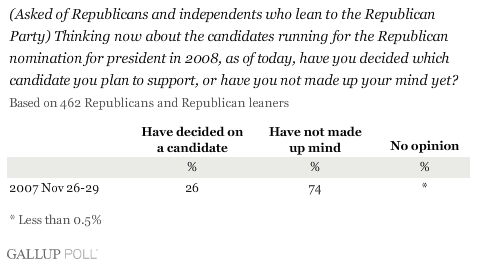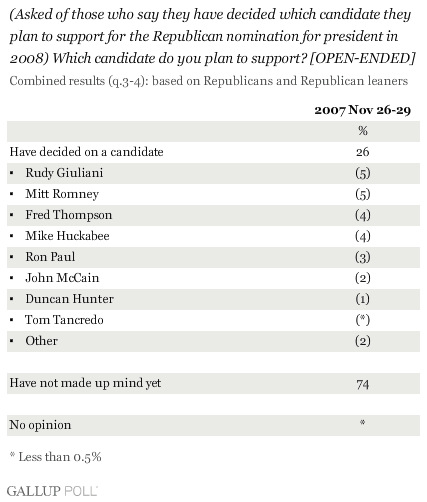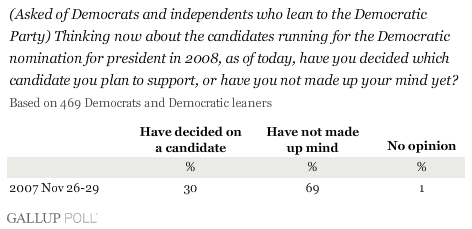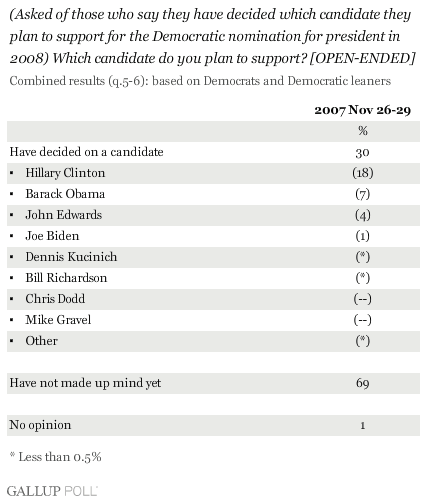PRINCETON, NJ -- Democrats are a little more likely than Republicans to say they have made up their minds about whom they will support for their party's presidential nomination. Democrats who have made up their minds are also more likely than Republicans to have decided on one particular candidate -- Hillary Clinton -- while Republicans who have made up their minds spread their preferences across a number of different candidates. But a large majority of those who identify with both parties choose the option "have not made up [my] mind yet" when it is explicitly presented, underscoring the significant potential for change in the national races as the caucus and primary season gets underway.
Giving Voters the Option to Say "Undecided"
The rise of former Arkansas Gov. Mike Huckabee in national and Iowa polls of Republicans is a reminder of how quickly the shape of an election can change in the period before actual voting begins. Many Americans will choose a candidate when they are asked for whom they would vote "if the election were being held today," and the evidence shows that when these choices are made close to an election, they are excellent predictors of actual voting behavior. But early in the process, the election is many months away, and it is understood that while these measures provide an excellent portrait of an election's current landscape, a lot can still change.
The potential for such change is made clear when the results of a question from a Nov. 26-29 Gallup Panel poll are examined. Representative samples of Republicans and Democrats were asked: "Thinking now about the candidates running for the [Republican/Democratic] nomination for president in 2008, as of today, have you decided which candidate you plan to support, or have you not made up your mind yet?"
This question did not prompt respondents with the names of any candidates and explicitly invited them to opt out of making a choice if they had not made up their minds yet. The results show that a large majority of both Republicans and Democrats opt for the "not made up [my] mind yet" alternative, leaving just a minority claiming to have decided whom they will support for their party's nomination.
There are some slight differences in the responses by party. Democrats are slightly more likely than Republicans to say they have made up their minds, and Democrats who have decided are more settled on one specific candidate (Clinton). By contrast, the smaller number of Republicans who have settled on a candidate are less unified in their choices. But the broad picture is quite clear: There is the significant potential for movement in voter preferences in both parties.
Republicans
Seventy-four percent of Republicans say they have not yet made up their minds whom they will support for the GOP nomination. Among those who do claim to have made up their minds, no single candidate dominates. Rudy Giuliani, Mitt Romney, Fred Thompson, Mike Huckabee, Ron Paul, John McCain, and Duncan Hunter are all named by between 1% and 5% of Republicans.


These data are somewhat at odds with the results of the traditional horse-race question in which voters are given a list of names and asked for whom they would vote. Giuliani has led all year in Gallup's national polls, although his lead has shrunk to just nine points in the most recent such poll, ahead of a tightly bunched group of four candidates: Huckabee, Thompson, McCain, and Romney. However, in response to Gallup's question asking Republicans without prompting to name the candidate they support, Giuliani has no lead, and all five of these candidates get roughly the same percentage of the Republican vote choice.
Democrats
Sixty-nine percent of Democrats say they have not made up their minds about whom they will support for their party's nomination. Among those who have made up their minds, Clinton dominates, chosen by more than twice as many Democrats as any other candidate. Behind Clinton are Barack Obama and John Edwards, with no other candidate getting more than 1% of the vote.


Clinton has led in most polls of Democrats all year, often by substantial margins, so it may be no surprise to find that Democratic voters who claim to have made up their minds are most likely to mention her as the candidate they will support. Still, one way of looking at these results is to say that more than 8 out of 10 Democrats either have decided on a candidate other than Clinton, or have not yet decided whom they support -- underscoring the enormous potential for change in the Democratic contest as the election campaign progresses.
Survey Methods
Results for the Panel study are based on telephone interviews with 1,003 national adults, aged 18 and older, conducted Nov. 26-29, 2007. Respondents were drawn from Gallup's household panel, which was originally recruited through random selection methods. The final sample is weighted so it is representative of U.S. adults nationwide. For results based on the total sample of national adults, one can say with 95% confidence that the maximum margin of sampling error is ±4 percentage points.
For results based on the sample of 462 Republicans or Republican leaners, the maximum margin of sampling error is ±6 percentage points.
For results based on the sample of 469 Democrats or Democratic leaners, the maximum margin of sampling error is ±6 percentage points.
In addition to sampling error, question wording and practical difficulties in conducting surveys can introduce error or bias into the findings of public opinion polls.
